Today’s scientific research collaborations are often multidisciplinary across organizational borders and time-zones. Communication that is based on emails or teleconferences is time consuming. In recent years many approaches have focused on building and establishing on-line communities. Other approaches focus on managing effort such as organizing work as tasks. Collaboratively working teams could potentially increase their efficiency by combining the task centered approach with the community approach. However, no existing approach combines an on-line community platform and a task centered approach to provide an open collaboration process.
This thesis presents the Organic Data Science approach which enables an open task centered on-line collaboration process. Key principles to address challenges of the task-centered collaboration approach are 1.) the self-organization of the community through task decomposition, 2.) an on-line community support based on social design principles and best practices and 3.) an open science process to enable unanticipated contributions.
The task-centered Organic Data Science framework approach is implemented based on the Semantic MediaWiki platform. The prototype implementation of the Organic Data Science framework is evaluated through a research project focused on the science question of modeling the age of water in an ecosystem. This project requires expertise in different research areas from multiple organizations within different time-zones. Different collaboration dimensions are evaluated such as how many different users access a task, how many different users are assigned to a task, how many different users edit the task metadata and how many different users edit the task content. The findings show that the framework supports the collaboration process.
In general the Organic Data Science framework is designed for helping scientists to collaborate to solve complex scientific research questions. The use of the Organic Data Science framework is not limited to scientific purpose, it helps to support complex knowledge intensive collaborative processes.
Keywords: Collaboration, Knowledge organization, Semantic Web, Semantic Media Wiki
The thesis theory is prototypically implemented and tested with the organic data science project. Science goal of the organic data science project is to define collaboratively “The Age of Water”. Basically there are two main research teams with their sub-groups. For every research disciple, domain specific models exist. To answer the defined science goal a holistic approach is needed. Collaboration is one key factor.
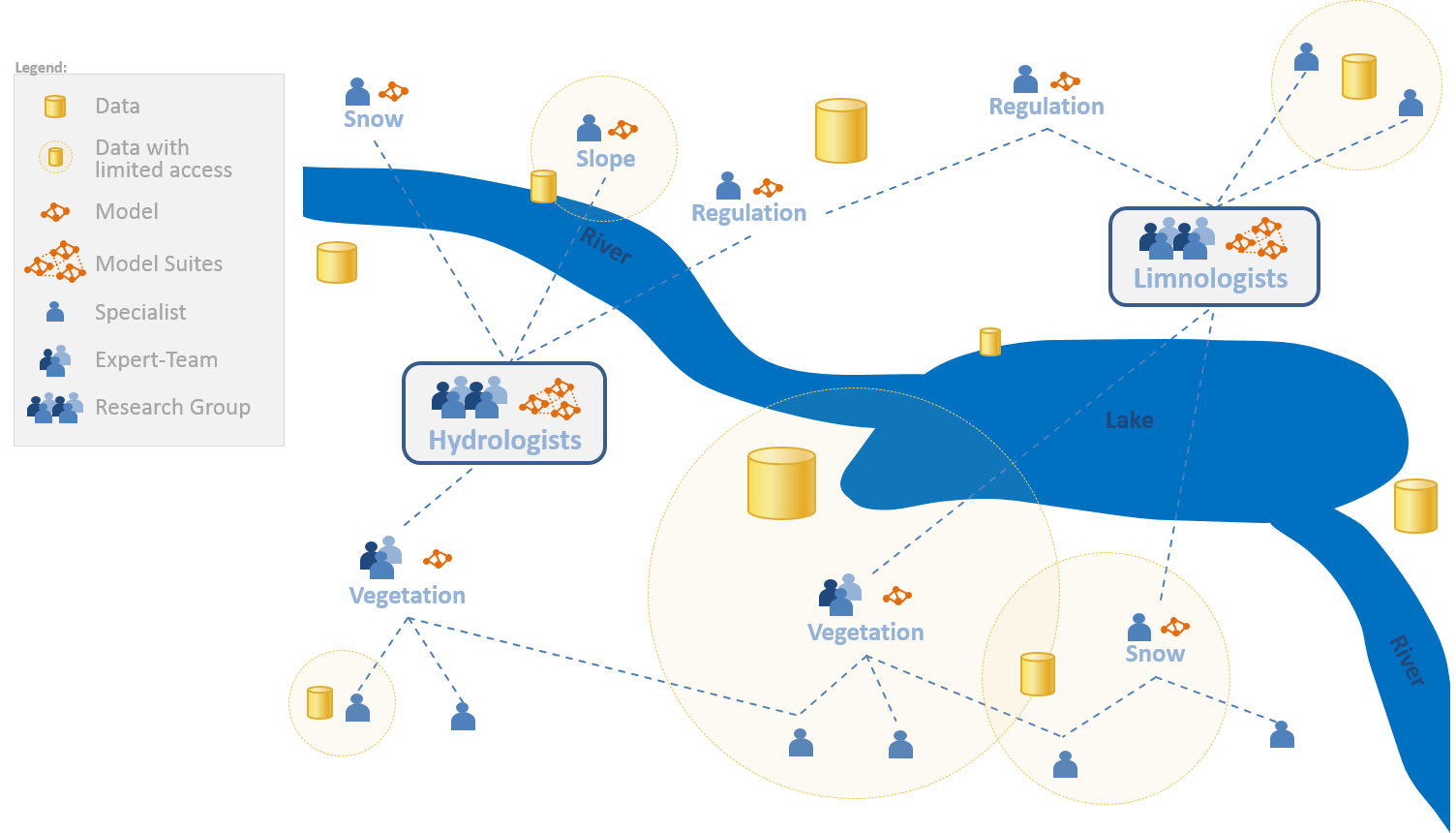
Challenges:
The collaborative tasks based concept follows the top-down approach. (1) First of all, the science goal is defined as top level task. (2) In the sound step main tasks are defined. (3) In the next step all tasks are decomposed until they are manageable and can be solved. These tasks typically involve less participants than tasks with a higher abstraction level. (4) After decomposing single tasks can be accomplished. (5) The knowledge of single tasks is now aggregated to the higher more abstract tasks. (6) Higher aggregated tasks can be modeled as a software component. Finally many loosely coupled software model component descriptions exist.
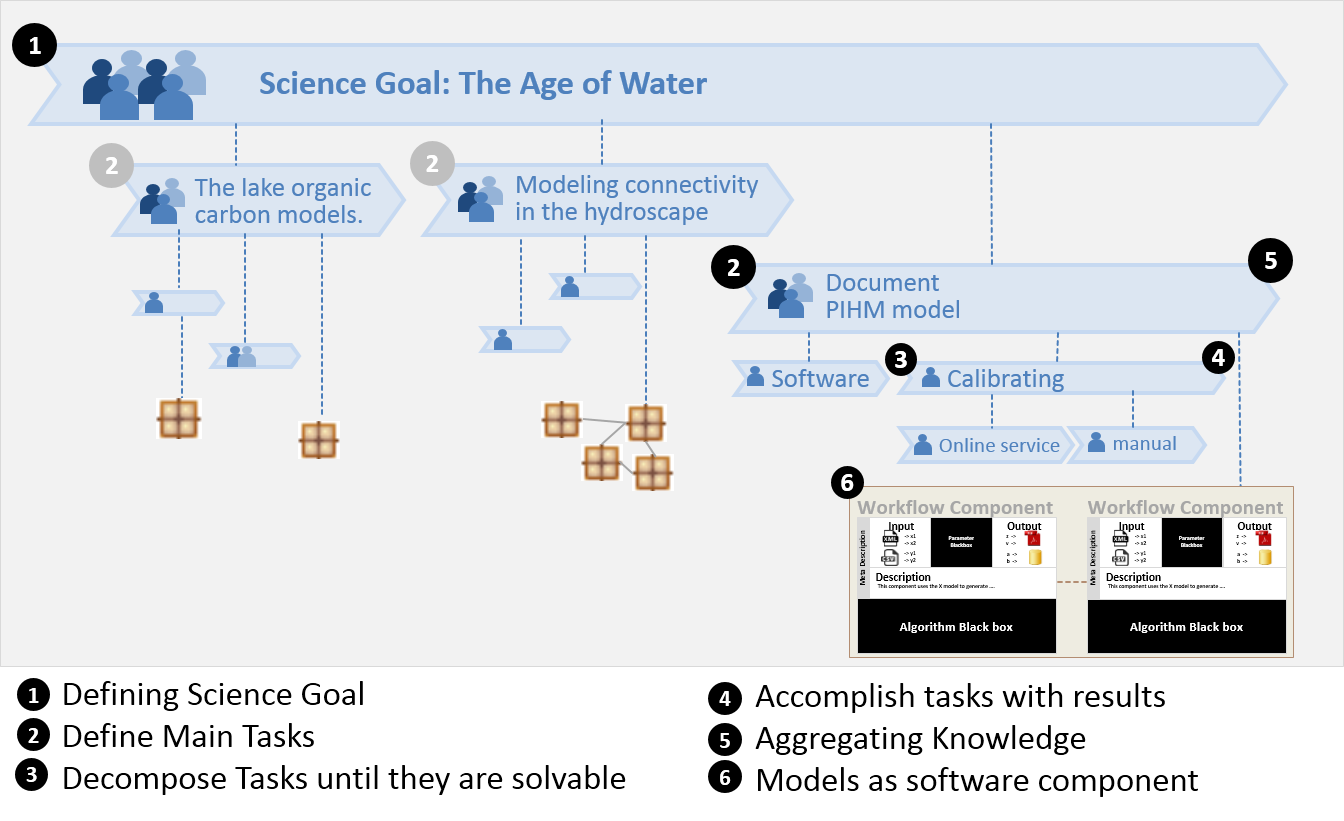
The Organic Data Science framework is built as an extension of the Semantic MediaWiki platform and uses its semantic capabilities to structure the content of the site, including task properties and user properties. The semantic wiki provides an intuitive user interface that hides from users any formal semantic notation. The site is accessible from http://www.organicdatascience.org.
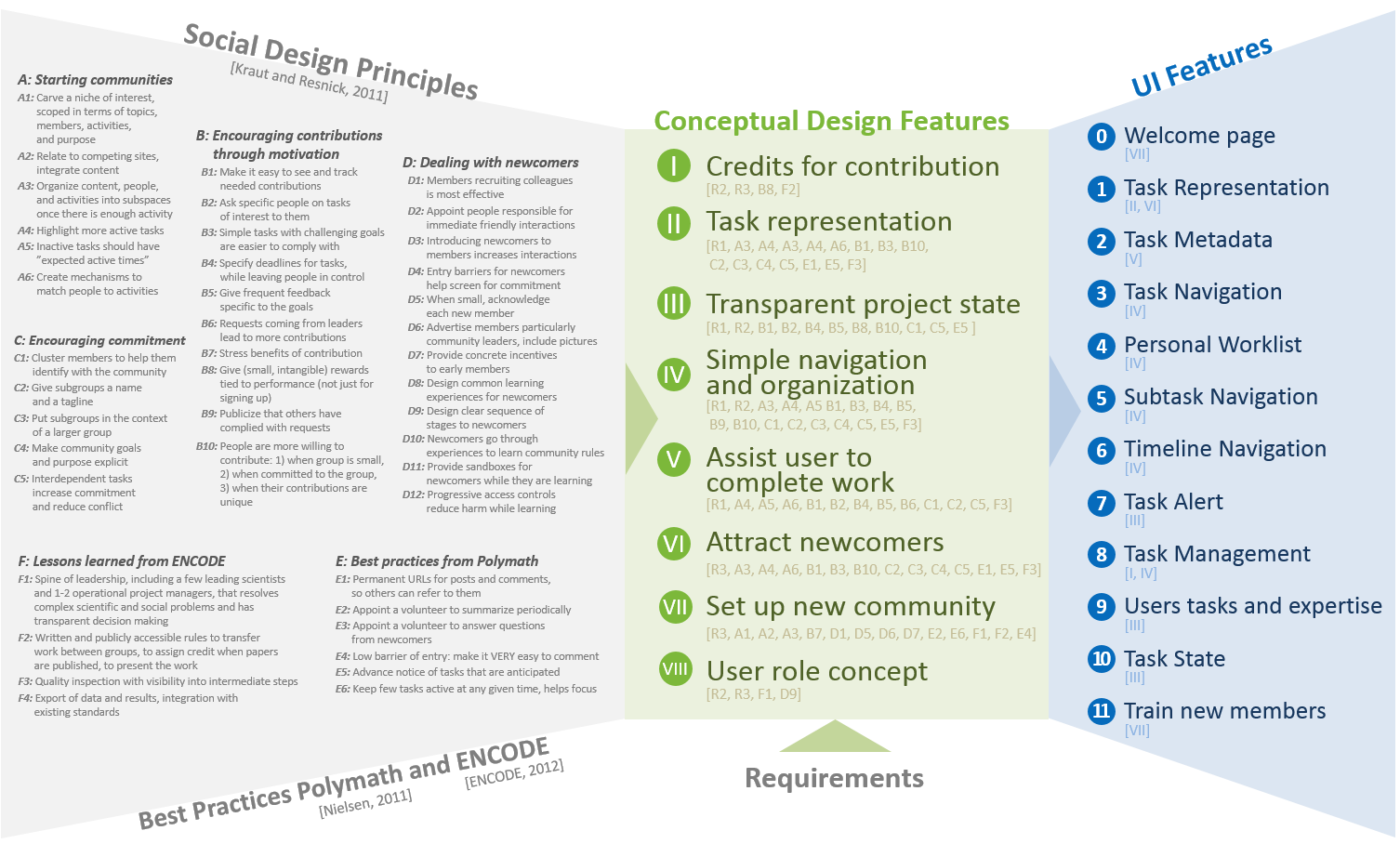
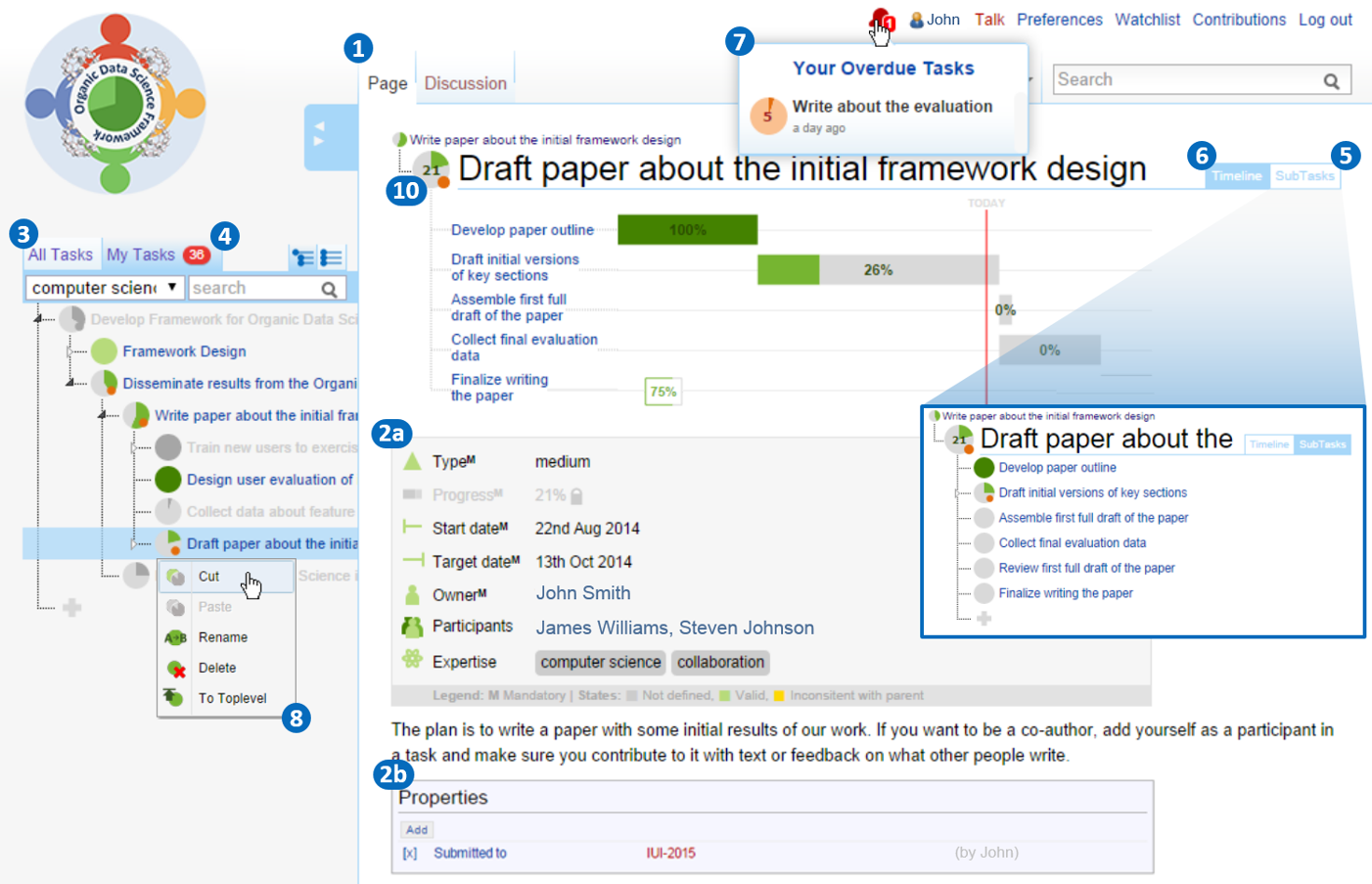
A collaboration network is created by using task metadata properties about owners and participants in tasks. Users are represented as nodes in the network, and each edge between two nodes represents that the two users are signed up for the same task one or more times. The number of tasks they have in common is expressed by the strength of edges.
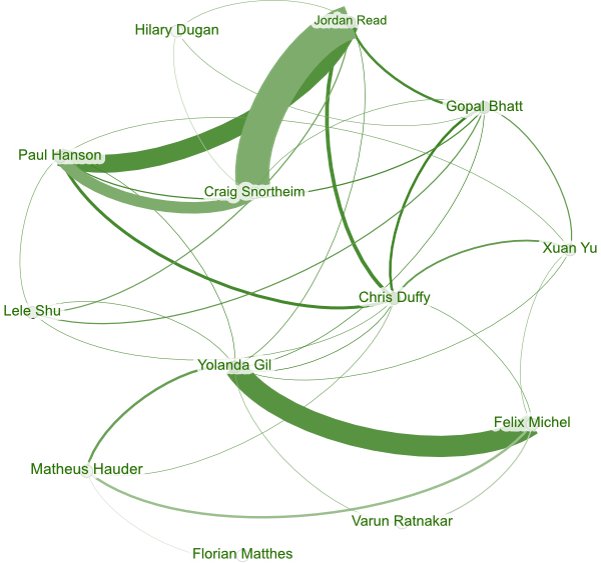
The heat map illustrate in red where users click most. Most clicks occur in areas where many of the task-oriented interface features are located.
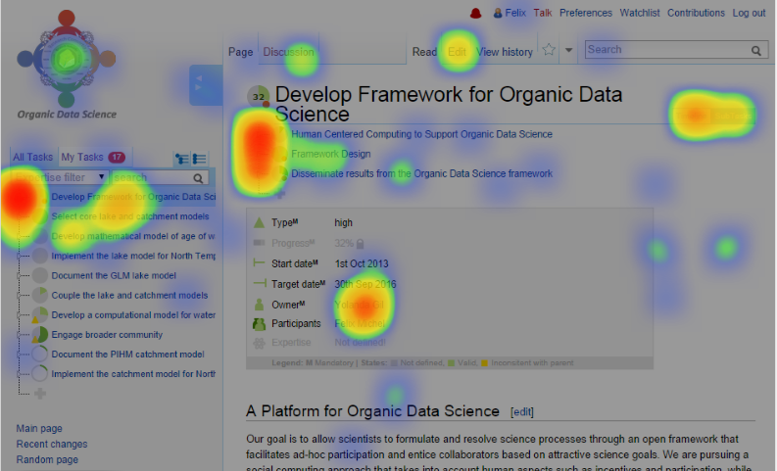
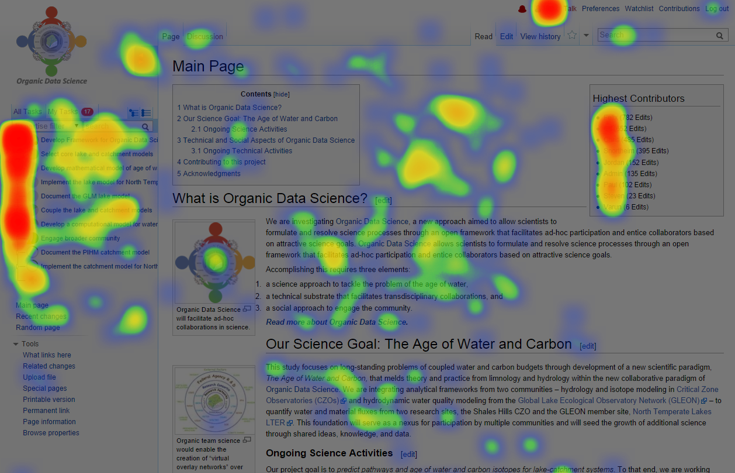
Different features are used by users to open task pages. Most users used the Task Navigation feature to find task pages. A probable explanation for this is the feature gives users an overview over all tasks, drill down quickly, and apply specific filters. The Task Alert feature was not used very often, but it is expected that this feature will be more important as the group faces deadlines (such as the writing of this paper, an upcoming scientific workshop, etc.).
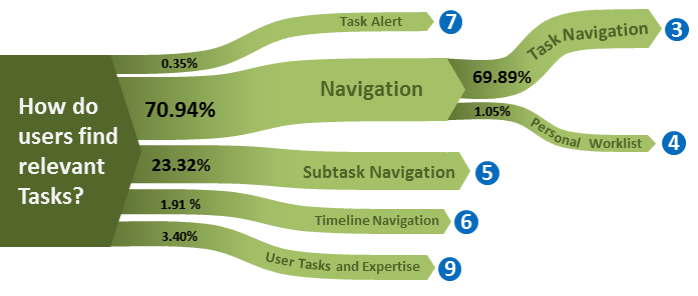
(more literature, see master thesis)
ENCODE (2012). Special issue on the encode project. volume 489. Nature
Y.Gil, V. Ratnakar and P. C. Hanson. Organic data publishing a novel approach to scientific data sharing. Second International Workshop on Linked Science -Tackling Big Data. Boston, 2012.
Y. Gil and P.Michelucci. Social Knowledge Collection. Handbook of Human Computation, Springer, 2013.
Y. Gil. From Data to Knowledge to Discoveries: Scientific Workflows and Artificial Intelligence. Scientific Programming, Volume 16, Number 4, 2008
A. Goodman, A Pepe, A. W. Blocker, C. L. Borgman, K. Cranmer, M. Crosas, R. D. Stefano, Y. Gil, P. Groth, M. Hedstrom, D. W. Hogg, V. Kashyap, A. Mahabal, A. Siemiginowska, A. Slavkovic. Ten Simple Rules for the Care and Feeding of Scientific Data. PLOS Computational Biology, 2014.
M. Sonntag, D. Karastoyanova and E. Deelman. Bridging The Gap Between Business And Scientific Workflows. 6th IEEE International Conference on e-Science, IEEE Computer Society, Stuttgart, Germany, 2010.
Nielsen, M. (2011). Reinventing Discovery: the new era of networked science. Princeton University Press.
Kraut, E. and Resnick, P. (2011). Building Successful Online Communities: Evidence-Based Social Design. MIT Press.
Y. Gil, V. Ratnakar, J. Kim, P. A. González-Calero, P. Groth, J. Moody and E. Deelman. WINGS: Intelligent Workflow-based Design of Computational Experiments. IEEE Intelligent Systems, vol. 26, no. 1, pp. 62-72, Jan.-Feb. 2011.